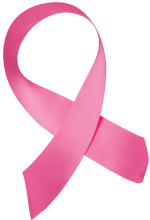Elizabeth A. Triana, M.D., FAAFP
Breast Cancer Awareness
According to the Centers for Disease Control and Prevention (CDC), breast cancer is the most common form of cancer in women, aside from non-melanoma skin cancer. Breast cancer is the number one cause of cancer death in Hispanic women. It is the second most common cause of cancer death in white, black, Asian/Pacific Islander, and American Indian/Alaska Native women.
Screening For Breast Cancer

Screening can start at home. Breast self-exams should be done
at home on a monthly basis. Check for lumps, changes in size or
shape of the breast, changes in your armpit, pain, and nipple
changes or discharge. Consult your doctor right away if you have
any of the changes listed above.
A clinical breast exam should be done by your doctor once a
year.
A screening mammogram should be done yearly. A mammogram is the
best way to detect breast cancer and can do so early enough to
treat. A base line mammogram should be done between the ages of
35-40. Yearly mammograms should start at 40. Ask your doctor for
an order. Based on your history and your family history your
doctor may want to order additional testing or even start
mammogram screening earlier.
Men are also at risk. Even though breast cancer is not as common
in men, there are documented cases. Men should seek medical
attention if they notice any changes in their breasts as well.
Prevention
You can help lower your risk of breast cancer in the following ways:
- Get screened for breast cancer regularly.
- Control your weight and exercise.
- Know your family history of breast cancer.
- Find out the risks and benefits of hormone replacement therapy.
- Limit the amount of alcohol you drink.
Breast Cancer Facts
Estimated number of new cases in the U.S. in 2012:
- Women - 226,870
- Men - 2,190
Early detection saves lives:
- Mammograms
- Clinical breast exams yearly
- Self-breast exams often
There is help for the uninsured:
- Ask your health care provider for resources and options
- Dollars for Mammograms
- Virginia B. Andes Clinic - Susan G. Koman Grant
Simple steps to reduce your risk:
- Have a healthy weight after menopause
- 30-60 minutes of exercise daily (brisk walking)
- Reduce the amount of alcohol consumed. The American Cancer Society recommends women only have one drink daily
Free downloadable book from the National Cancer Institute:
- What you need to know about Breast Cancer
- www.cancer.org
Facts taken from: National Cancer Institute
Being a caregiver means helping without being paid to do so. But helping a patient during a difficult time is priceless such as simple daily tasks (cooking, dressing, driving, insurance problems, taking care of other family members). Without the help of a caregiver the patient may not get the help they need. You are appreciated and we thank you for your dedication!
Local Support Groups
- Reach to Recovery: Breast Cancer information and support. American Cancer Society - Beverly Clayton 941-627-3000.
- Look Good Feel Better: For women in active treatment. Register at 800-ACS-2345.
- I Can Cope Cancer Education: Classes held at Fawcett Memorial Hospital's H2U Center. Contact June Davis 941-629-1181 ext 6716.
- Cancer Survivor's Network. 877-333-4673 or www.acscsn.org.
We accommodate same day appointments & accept many different health insurance plans. Contact us today & get on the road to good health. Your life depends on it!
FAMILY PRACTICE
The Triana Prevention Center is conveniently located on Harbor Blvd. in Port Charlotte. Dr. Triana offers same day appointments and is accepting new patients.
LIVE RADIO SHOW!
-
Dr. Triana also has a very informative live radio show that broadcasts on channel WCCF 1580 AM every Friday morning at 11:05-12:00. You can web-stream the broadcast live from www.wccfam.com or listen to previously recorded Radio Shows.